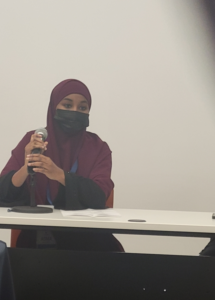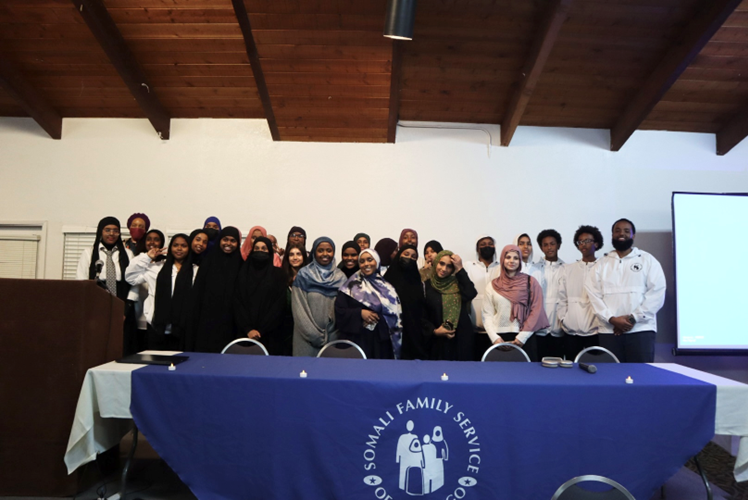A blessing I often take for granted is the ability to share with others my own individual nuances and experiences that have inspired me to continue striving for an equitable future for myself and my community. As you read further, I invite you to reflect on the blessing that you have also taken for granted, one that can benefit us collectively in forging equity-centered selves and communities.
In my case, it is the privilege of being able to relocate to the United States as a Somali refugee, and the privilege of finally obtaining resettlement despite the harsh circumstances we faced previously– a privilege not granted to many refugees, immigrants, and displaced people around the world. Nonetheless, being a refugee comes with its own set of challenges, including language and cultural differences for some, economic and housing instability for others, and a profound sense of otherness due to religious or cultural identities for many. Unfortunately, for the majority, it is a combination of challenges.
As a refugee, woman of color, and especially as a Muslim, my identities have been prime examples of being subjected to otherness, whether it was for wearing my Hijab, for not speaking English “properly,” or for simply looking different. However, through these adversities, I have had the opportunity to use them as motivation to learn, grow in my faith, and share with others. Writing this blog post is one effort, aimed not only at highlighting my personal journey but also at extending my solidarity to anyone who has suffered from hate, discrimination, otherness, or any other form of injustice enabled through systems and institutions that do not value equity at their core.
It’s the very reason why I studied Public Health and aspire to further educate myself on how institutions and systems impact the health of populations, particularly the most vulnerable members in disadvantaged communities. Witnessing a refugee camp was a testament to the importance of public health. The extreme limitations on resources, including the lack of proper nutrients, good air quality, health professionals, and hospital supplies, led many to develop diseases that were not curable in such conditions. My experiences continue to serve as motivation for working within my community and make me uniquely suited to addressing the needs of those around me.
I began working at my current organization during the pandemic, assisting with resource navigation for refugee and immigrant community members. Somali Family Service of San Diego is a key organization in San Diego dedicated to addressing gaps in healthcare and economic needs in immigrant and refugee communities, with a particular emphasis on increasing community engagement and fostering future leaders. What stands out to me at Somali Family Service of San Diego is that most of my colleagues including myself are either first- or second-generation refugees or immigrants, there is a shared notion that we have a responsibility towards our communities and all underserved individuals. During the pandemic, it was even more evident how our communities exemplify resilience and strength, and we continue to build power together. It’s been an honor and a blessing to participate in programs that center on significant issues often under-addressed in my community.
Working with the refugee and immigrant communities, as well as other underserved populations, has taught me that circumstances are constantly changing, and the needs of the communities I serve continue to evolve. To advance strategies and effectively support others, I must also seize opportunities that can enhance my leadership impact. The Together Toward Equity Fellowship was an incredible opportunity that could provide me with exactly what I was seeking. And I’m beyond humbled to have been selected for its first cohort.

So far in the Fellowship, I have found the monthly cohort meetings to be incredibly enriching. We have delved into various significant topics, such as identity leadership, personality assessments, and the impact of storytelling. These sessions have not only expanded my knowledge but have also provided practical tools and frameworks that I can apply in my work with underserved communities. One aspect that particularly resonated with me was the exploration of embodied leadership. Through deep discussions and reflections, it showed me how my personal experience and identities shaped my leadership style and approach. For instance, I recognized that my drive to serve stems from my own encounters with adversity, scarcity, and the struggles of navigating unfamiliar systems as a refugee and woman of color.
My favorite experience so far in the fellowship has been the in-person meeting. Besides seeing everyone face-to-face, what really resonated with me was being present in an inclusive environment. The in-person session was unique in the way it allowed me to engage in a conversation centered around sharing. I remember walking in with the idea that it would be a regular meeting, but the atmosphere quickly shifted, encouraging everyone in this cohort to be their authentic selves. It is an opportunity we don’t often get in our busy schedules, but one I deeply appreciate. The in-person interaction has been an invaluable lesson in cultivating environments where authenticity thrives—especially considering my identities and the numerous times I have participated in gatherings where sharing felt forced, or my safety was compromised for the sake of others. The in-person session highlighted for me a significant aspect of personal growth: the importance of truly listening and being present to the meaning behind each person’s story. It is something I often question myself about, especially in my current community work—how well am I listening to others and what culture am I fostering to ensure that individuals and communities I serve, feel like they belong at all times? I realized that a big part of cultivating that space is ensuring that safety is a priority.
This Fellowship has been an eye-opening experience for me. It has made me even more mindful about how I approach my daily work—whether it’s attending meetings, leading workshops, or planning events. But beyond that, it has reminded me, as I hope it will for you, of the countless blessings throughout my professional, academic, and personal journey. As I reflect on the challenges that deepened my commitment to equity, I find that the most valuable and important piece of this journey has been to share our own lived-experiences and listen deeply to learn from those around us.


Amazing and insightful post! Loved reading it.